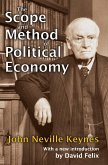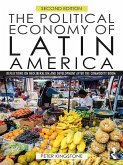The Economic Pivot in a Political Context (eBook, PDF)
Redaktion: Wolf, Jr.
45,95 €
45,95 €
inkl. MwSt.
Sofort per Download lieferbar

23 °P sammeln
45,95 €
Als Download kaufen

45,95 €
inkl. MwSt.
Sofort per Download lieferbar

23 °P sammeln
Jetzt verschenken
Alle Infos zum eBook verschenken
45,95 €
inkl. MwSt.
Sofort per Download lieferbar
Alle Infos zum eBook verschenken

23 °P sammeln
The Economic Pivot in a Political Context (eBook, PDF)
Redaktion: Wolf, Jr.
- Format: PDF
- Merkliste
- Auf die Merkliste
- Bewerten Bewerten
- Teilen
- Produkt teilen
- Produkterinnerung
- Produkterinnerung

Bitte loggen Sie sich zunächst in Ihr Kundenkonto ein oder registrieren Sie sich bei
bücher.de, um das eBook-Abo tolino select nutzen zu können.
Hier können Sie sich einloggen
Hier können Sie sich einloggen
Sie sind bereits eingeloggt. Klicken Sie auf 2. tolino select Abo, um fortzufahren.

Bitte loggen Sie sich zunächst in Ihr Kundenkonto ein oder registrieren Sie sich bei bücher.de, um das eBook-Abo tolino select nutzen zu können.
"When all too many so-called experts see things as they wish they were, Charles Wolf analyze facts to provide genuine insights into the past, present and future
- Geräte: PC
- mit Kopierschutz
- eBook Hilfe
- Größe: 9.74MB
Andere Kunden interessierten sich auch für
![The Scope and Method of Political Economy (eBook, PDF) The Scope and Method of Political Economy (eBook, PDF)]() John Neville KeynesThe Scope and Method of Political Economy (eBook, PDF)45,95 €
John Neville KeynesThe Scope and Method of Political Economy (eBook, PDF)45,95 €![The Political Economy of Latin America (eBook, PDF) The Political Economy of Latin America (eBook, PDF)]() Peter KingstoneThe Political Economy of Latin America (eBook, PDF)45,95 €
Peter KingstoneThe Political Economy of Latin America (eBook, PDF)45,95 €![Social Protection, Capitalist Production (eBook, PDF) Social Protection, Capitalist Production (eBook, PDF)]() Philip ManowSocial Protection, Capitalist Production (eBook, PDF)59,95 €
Philip ManowSocial Protection, Capitalist Production (eBook, PDF)59,95 €![Turkey's Pivot to the African Continent (eBook, PDF) Turkey's Pivot to the African Continent (eBook, PDF)]() Turkey's Pivot to the African Continent (eBook, PDF)51,95 €
Turkey's Pivot to the African Continent (eBook, PDF)51,95 €![The Politics of Financial Control (eBook, PDF) The Politics of Financial Control (eBook, PDF)]() Gordon ReidThe Politics of Financial Control (eBook, PDF)29,95 €
Gordon ReidThe Politics of Financial Control (eBook, PDF)29,95 €![A Political and Economic Dictionary of the Middle East (eBook, PDF) A Political and Economic Dictionary of the Middle East (eBook, PDF)]() A Political and Economic Dictionary of the Middle East (eBook, PDF)176,95 €
A Political and Economic Dictionary of the Middle East (eBook, PDF)176,95 €![Power in Business and the State (eBook, PDF) Power in Business and the State (eBook, PDF)]() Frank BealeyPower in Business and the State (eBook, PDF)30,95 €
Frank BealeyPower in Business and the State (eBook, PDF)30,95 €-
-
-
"When all too many so-called experts see things as they wish they were, Charles Wolf analyze facts to provide genuine insights into the past, present and future
Dieser Download kann aus rechtlichen Gründen nur mit Rechnungsadresse in A, B, BG, CY, CZ, D, DK, EW, E, FIN, F, GR, HR, H, IRL, I, LT, L, LR, M, NL, PL, P, R, S, SLO, SK ausgeliefert werden.
Produktdetails
- Produktdetails
- Verlag: Taylor & Francis eBooks
- Seitenzahl: 237
- Erscheinungstermin: 6. Februar 2018
- Englisch
- ISBN-13: 9781351291279
- Artikelnr.: 54129307
- Verlag: Taylor & Francis eBooks
- Seitenzahl: 237
- Erscheinungstermin: 6. Februar 2018
- Englisch
- ISBN-13: 9781351291279
- Artikelnr.: 54129307
- Herstellerkennzeichnung Die Herstellerinformationen sind derzeit nicht verfügbar.
Jr. Wolf
I: Economic Forecasts and the Changing Global Economy
1: Nonaccountability Among the Experts
2: The Ebb of Neo-Mercantilism
3: Pitfalls of Public Policy: Strategic Trade Policy and Industrial Policy
4: Glib Rhetoric, Loose Thinking
5: Taxes, Trade, and Growth
6: Global Competition for Long-Term Capital: Who Will Win?
7: What's Behind the Weak Dollar?
8: Who Really Needs a Country Anymore?
9: Why Asia Will Matter More Than Europe
10: Clintonomics versus Reaganomics
11: Social Capital and Economic Performance
12: "Downsizing," Corporate Responsibility, and the Trade-Off Between Efficiency and Equity
II: Economic Power and Military Power
13: Competing Priorities in the Post-Cold War Era
14: Military Power, Economic Power, and a Less Disorderly World
15: Economics and Security in Central Europe
16: Economic Instruments, Military Instruments, and National Power
17: Arms, Trade, and a Less Disorderly World
18: Gun Control at Home, Decontrol Abroad
19: Nixon's View of the World
20: Where the Disorderly World is Heading
III: The Economies of Japan and China
21: Dissecting the Japanese Problem with "Occam's Razor"
22: Resuming the Protracted U.S.-Japan Economic Debate
23: Clearing the Fog Over U.S.-Japan Economic Relations
24: The Strong Yen of a Weakened Economy
25: Sense and Nonsense About Dealing with Japan
26: China's Enlarged Economy
27: Asia's Rise Will Advance U.S. Prosperity
28: The United States and Japan: "Revisionism" Revisited
29: Rivalry and Disputes Among the Big Three
IV: Transforming the Russian and Ukrainian Economies
30: Transforming Command Economies into Market Economies: Problems, Solutions, Obstacles
31: The Ingredients of Transforming Command Economies
32: Democracy and Free Markets
33: Some Hopeful Signs amidst the Commonwealth's Economic Travails
34: Limited Optimism Rather Than Boundless Pessimism About the Russian Economy
35: Two are Better Than One
36: The Question of Soviet Aid
37: Aiding Russia and Ukraine
38: To Privatize, Randomize
39: Swapping Debt for Equity in Russia
1: Nonaccountability Among the Experts
2: The Ebb of Neo-Mercantilism
3: Pitfalls of Public Policy: Strategic Trade Policy and Industrial Policy
4: Glib Rhetoric, Loose Thinking
5: Taxes, Trade, and Growth
6: Global Competition for Long-Term Capital: Who Will Win?
7: What's Behind the Weak Dollar?
8: Who Really Needs a Country Anymore?
9: Why Asia Will Matter More Than Europe
10: Clintonomics versus Reaganomics
11: Social Capital and Economic Performance
12: "Downsizing," Corporate Responsibility, and the Trade-Off Between Efficiency and Equity
II: Economic Power and Military Power
13: Competing Priorities in the Post-Cold War Era
14: Military Power, Economic Power, and a Less Disorderly World
15: Economics and Security in Central Europe
16: Economic Instruments, Military Instruments, and National Power
17: Arms, Trade, and a Less Disorderly World
18: Gun Control at Home, Decontrol Abroad
19: Nixon's View of the World
20: Where the Disorderly World is Heading
III: The Economies of Japan and China
21: Dissecting the Japanese Problem with "Occam's Razor"
22: Resuming the Protracted U.S.-Japan Economic Debate
23: Clearing the Fog Over U.S.-Japan Economic Relations
24: The Strong Yen of a Weakened Economy
25: Sense and Nonsense About Dealing with Japan
26: China's Enlarged Economy
27: Asia's Rise Will Advance U.S. Prosperity
28: The United States and Japan: "Revisionism" Revisited
29: Rivalry and Disputes Among the Big Three
IV: Transforming the Russian and Ukrainian Economies
30: Transforming Command Economies into Market Economies: Problems, Solutions, Obstacles
31: The Ingredients of Transforming Command Economies
32: Democracy and Free Markets
33: Some Hopeful Signs amidst the Commonwealth's Economic Travails
34: Limited Optimism Rather Than Boundless Pessimism About the Russian Economy
35: Two are Better Than One
36: The Question of Soviet Aid
37: Aiding Russia and Ukraine
38: To Privatize, Randomize
39: Swapping Debt for Equity in Russia
I: Economic Forecasts and the Changing Global Economy
1: Nonaccountability Among the Experts
2: The Ebb of Neo-Mercantilism
3: Pitfalls of Public Policy: Strategic Trade Policy and Industrial Policy
4: Glib Rhetoric, Loose Thinking
5: Taxes, Trade, and Growth
6: Global Competition for Long-Term Capital: Who Will Win?
7: What's Behind the Weak Dollar?
8: Who Really Needs a Country Anymore?
9: Why Asia Will Matter More Than Europe
10: Clintonomics versus Reaganomics
11: Social Capital and Economic Performance
12: "Downsizing," Corporate Responsibility, and the Trade-Off Between Efficiency and Equity
II: Economic Power and Military Power
13: Competing Priorities in the Post-Cold War Era
14: Military Power, Economic Power, and a Less Disorderly World
15: Economics and Security in Central Europe
16: Economic Instruments, Military Instruments, and National Power
17: Arms, Trade, and a Less Disorderly World
18: Gun Control at Home, Decontrol Abroad
19: Nixon's View of the World
20: Where the Disorderly World is Heading
III: The Economies of Japan and China
21: Dissecting the Japanese Problem with "Occam's Razor"
22: Resuming the Protracted U.S.-Japan Economic Debate
23: Clearing the Fog Over U.S.-Japan Economic Relations
24: The Strong Yen of a Weakened Economy
25: Sense and Nonsense About Dealing with Japan
26: China's Enlarged Economy
27: Asia's Rise Will Advance U.S. Prosperity
28: The United States and Japan: "Revisionism" Revisited
29: Rivalry and Disputes Among the Big Three
IV: Transforming the Russian and Ukrainian Economies
30: Transforming Command Economies into Market Economies: Problems, Solutions, Obstacles
31: The Ingredients of Transforming Command Economies
32: Democracy and Free Markets
33: Some Hopeful Signs amidst the Commonwealth's Economic Travails
34: Limited Optimism Rather Than Boundless Pessimism About the Russian Economy
35: Two are Better Than One
36: The Question of Soviet Aid
37: Aiding Russia and Ukraine
38: To Privatize, Randomize
39: Swapping Debt for Equity in Russia
1: Nonaccountability Among the Experts
2: The Ebb of Neo-Mercantilism
3: Pitfalls of Public Policy: Strategic Trade Policy and Industrial Policy
4: Glib Rhetoric, Loose Thinking
5: Taxes, Trade, and Growth
6: Global Competition for Long-Term Capital: Who Will Win?
7: What's Behind the Weak Dollar?
8: Who Really Needs a Country Anymore?
9: Why Asia Will Matter More Than Europe
10: Clintonomics versus Reaganomics
11: Social Capital and Economic Performance
12: "Downsizing," Corporate Responsibility, and the Trade-Off Between Efficiency and Equity
II: Economic Power and Military Power
13: Competing Priorities in the Post-Cold War Era
14: Military Power, Economic Power, and a Less Disorderly World
15: Economics and Security in Central Europe
16: Economic Instruments, Military Instruments, and National Power
17: Arms, Trade, and a Less Disorderly World
18: Gun Control at Home, Decontrol Abroad
19: Nixon's View of the World
20: Where the Disorderly World is Heading
III: The Economies of Japan and China
21: Dissecting the Japanese Problem with "Occam's Razor"
22: Resuming the Protracted U.S.-Japan Economic Debate
23: Clearing the Fog Over U.S.-Japan Economic Relations
24: The Strong Yen of a Weakened Economy
25: Sense and Nonsense About Dealing with Japan
26: China's Enlarged Economy
27: Asia's Rise Will Advance U.S. Prosperity
28: The United States and Japan: "Revisionism" Revisited
29: Rivalry and Disputes Among the Big Three
IV: Transforming the Russian and Ukrainian Economies
30: Transforming Command Economies into Market Economies: Problems, Solutions, Obstacles
31: The Ingredients of Transforming Command Economies
32: Democracy and Free Markets
33: Some Hopeful Signs amidst the Commonwealth's Economic Travails
34: Limited Optimism Rather Than Boundless Pessimism About the Russian Economy
35: Two are Better Than One
36: The Question of Soviet Aid
37: Aiding Russia and Ukraine
38: To Privatize, Randomize
39: Swapping Debt for Equity in Russia







